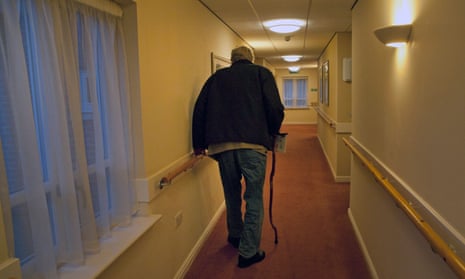Once again, Polly Toynbee deploys her deep knowledge of the deficiencies of social services to good effect (People are dying waiting for social care. Wealthy people’s inheritance issues are not a priority, 22 November). Policy reform needs to focus first on the weakness of the care sector, where poor pay, staffing problems and inadequate training lead people of my age – as they observe how friends and neighbours are being treated – to cross their fingers and hope they can at least avoid institutional care.
Second, there is a need to recognise the particular unfairness that arises from the failure to regard dementia as an illness, denying its sufferers a fully funded response from the NHS. Informal and family care can achieve much, but it is dementia that imposes unbearable demands.
If attention is given to these two issues, costs will of course rise. It is reasonable to expect people who have accumulated substantial assets to contribute to these costs. But since severe need for care is hard to anticipate in advance, the means-testing system can in that sense be seen as an arbitrary and unpredictable tax falling on the unlucky within that group. There are other ways of raising resources from the asset-rich, notably the improvement and extension of inheritance tax and the imposition of a wealth tax.
Michael Hill
Emeritus professor of social policy, University of Newcastle
Thank you, Polly Toynbee, for making the distinction between the urgent need for better funding of social care and the not unreasonable aspiration to try to end the lottery of how care needs can affect potential inheritance assets.
Andrew Dilnot proposed the introduction of a lifetime maximum personal contribution to care costs; in September last year, the Tories said they would set this at £86,000 (although they have now delayed its introduction until October 2025). That would be a massive bonus for the beneficiaries of the better-off, whose estates may be worth 10 times that figure and more. In contrast, somebody whose only capital asset is a modest house in the provinces could still be spending well over 50% of their potential estate.
Dilnot also recommended raising the means-tested threshold, above which people are liable for the full cost of their care, from the current £23,250 to £100,000. If that were to be implemented without the lifetime maximum limit, it would greatly favour the beneficiaries of the less wealthy.
This is a policy that ought to appeal more to the Labour party than the Tories. But until the dire state of social care services is addressed by a substantial increase in public funding, even a fairer, less regressive approach to inheritance issues is unlikely to be an affordable priority.
John Harvey
Hayfield, Derbyshire
Helping a relative in Ireland has brought me into close contact with its Fair Deal scheme for supporting those who need full-time care. Recipients have to contribute 80% of their annual income, plus 22.5% of the value of their home and other assets, towards the cost of their care. The Irish state’s Health Service Executive (HSE) pays the rest.
Various committed expenses are deducted from the assessed income and the first €36,000 of anyone’s assets are disregarded. Thus poorer families are protected. Even for the rich, it may be worth taking up the deal because the HSE is charged less per resident month than private customers.
The Fair Deal gives clarity and certainty to the person needing care and their relatives, and also to the care sector, supporting investment, recruitment and career development. I suggest all UK politicians take an urgent look at it.
Tim Johnson
London
